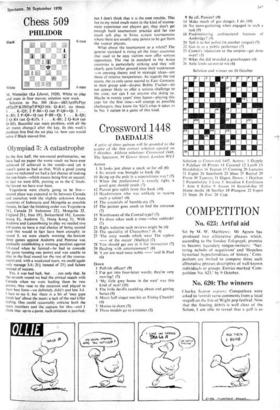Chess 509
PHILIDOR
M. Niemeijer (La Liberte, 1928). Whi e to play and mate in four moves; solution next week. Solution to No. 508 (Kiss--4B3/ plPkPlp/ pP2p2P/K3N3/p7/P3Q3/16); Q-K41, no threat.
1 . . . K-Q3; 2 P-B8=Q (set P-Q8=Q). 1 . . K-B3; 2 P-Q8=Q (set P-138=0). 1 . . . K-Q1;
2 Q-R4 (set Q-Kt5). I . . . K-B!; 2 Q-Kt4 (set Q-B5). Beautiful star mate problem, with all the set mates changed after the key. In this week's problem first find the set play i.e. how you would solve if Black moved first.
Olympiad 3: A catastrophe
In the first half, the ten-round preliminaries, we have had on paper the worst result we have ever achieved (if achieved is the word)—and yet it wasn't quite as bad as that. With a good young team we reckoned we had a fair chance of making the top finals—which means being first or second; in fact we were fifth, putting us in the C finals. the lowest we have ever been.
Yugoslavia were clearly going to be first— second place was expected to lie between Canada and ourselves with the slightly unknown Asian countries of Indonesia and Mongolia as possible threats. In fact the finishing order was Yugoslavia 314, Canada 23 Indonesia 224, Mongolia 22, England 211, Iran 191, Switzerland 181, Luxem- bourg 84, Andorra 74, Hong Kong 54. With Andorra and Luxembourg to play we needed two 4-0 scores to have a real chance of being second (and this would in fact have been enough): in round 8. we were clearly winning the bottom three games against Andorra and Penrose was gradually establishing a winning position against Ulvestad when he fainted—he had to concede the game (costing one point) and was unable to play in the final round (or the rest of the tourna- ment) and. with a weakened team, we could again only manage 3-1; 211 instead of 231 and failure instead of success.
Yes, it was bad luck, but . . . not only that. In the seventh round we had the critical match with Canada when we were leading them by two points; they rose to the occasion and played in their best form—we definitely didn't and lost 3-I. I hate to say it. but there is a bit of 'nice guys finish last' about the team; a lack of the real killer feeling. One could reasonably criticise both the team members and the captain for this—and I think that. up to a point. such criticism is justified: but I don't think that it is the root trouble. This lies to my mind much more in the kind of tourna- ment experience our players get; they don't get enough hard tournament practice and far too much soft play in Swiss system tournaments where there are usually easy points to be got from the weaker players.
What about the tournament as a whole? The general standard is rising all the time; countries that used to be easy victims now offer serious opposition. The rise in standard in the Asian countries is particularly striking and they will clearly gain further ground since their weaknesses —in opening theory and in strategic ideas—are those of relative inexperience. As regards the top teams, the us only came second to East Germany in their group and—despite Bobby Fischer—do not appear likely to offer a serious challenge to the USSR; nor can I see anyone else doing so. Maybe in twenty years' time Japan—playing this year for the first time—will emerge as possible challengers; they know (in 'Go') what it takes to be No. 1 nation in a game of this kind.


































 Previous page
Previous page